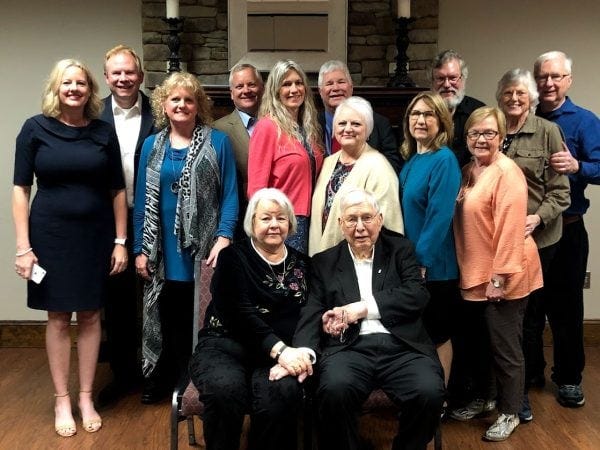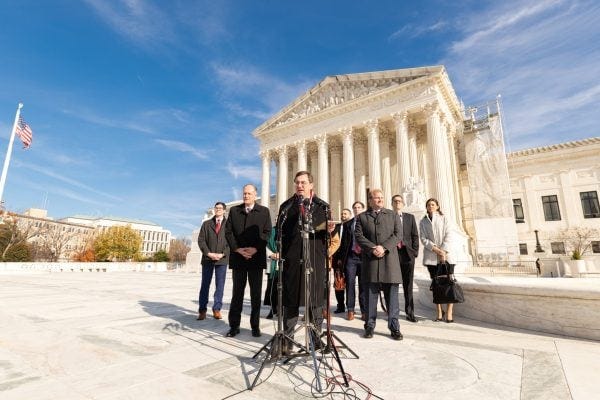Confessions of a Jesus Freak
Read that feature at The Christian Chronicle this week. Also in the news, one of our leading Bible educators and writers has died.
GOOD AFTERNOON, Christian Chronicle readers!
This is Bobby Ross Jr., editor-in-chief of the Chronicle, excited to share our latest news and features in our new Substack format.
Among our headlines: Cecil May Jr., one of our fellowship’s most prominent Bible educators and writers, has died at 93.
May was always such a blessing to me in my reporting work with the Chronicle. He never failed to provide kind, thoughtful responses to my questions.
“We must obey God rather than the sweep of culture,” I remember him saying.
Also on our website this week: Confessions of a Jesus Freak, an in-depth feature by Jerry Mitchell.
Mitchell interviews Mark Heimermann, who grew up in Churches of Christ and was a driving force behind dcTalk’s groundbreaking album, which turns 30 this year.
And finally, we have an update on U.S. vs. Skrmetti — a major U.S. Supreme Court case — from correspondent Kenneth Pybus.
Pybus also wrote our front-page profile earlier this year on Skrmetti himself — that is, Tennessee Attorney General Jonathan Skrmetti, a member of the Harpeth Hills Church of Christ in Brentwood, south of Nashville.
To reach us with comments, questions or concerns, please don’t reply to this message. Instead, email us directly at letters@christianchronicle.org.
Preacher and Bible educator Cecil May Jr. dies at 93
By Calvin Cockrell | Media Editor
Cecil May Jr., dean emeritus of the Faulkner University Bible college, died Sunday — soon after his 93rd birthday — his family announced.
The longtime evangelist, Bible professor and columnist for the Gospel Advocate and Magnolia Messenger had recently received an honorary doctorate in Christian education from Faulkner, located in Montgomery, Ala.
His first wife, Winnie, died on a Sunday nine years earlier, in 2016. They had four children together, Betty Lozada, Cecil May III, Roslyn Miller and Richard May. Cecil May Jr. married Janice a year after Winnie’s death.
May’s family remembers him for his love for them, God, the church and every person he met — and for his passion for preaching the Gospel and training Christians to carry out that mission.
He advocated strongly for Christian unity.

“I think lines of division, including even refusal of any association, have been drawn over too many differences,” May told The Christian Chronicle in 2018.
Confessions of a Jesus Freak
By Jerry Mitchell | Correspondent
“Jesus Freak,” an album hailed by some as “the Sgt. Pepper’s of Contemporary Christian Music,” turns 30 this year.
“It’s hard to think of a more groundbreaking, genre-expanding, or era-defining album,” Christianity Today said of dc Talk’s 1995 release, dubbing it “the most important Christian pop album of all time.”
Music critic Adam P. Newton said the songs resonated with him and other God-loving Gen-Xers. “It was our album,” he said. “And the lyrics were ones you could hear your youth pastor preach about.”
But what many may not know is the unlikely role that a member of a Church of Christ, Mark Heimermann, played in the project.
Supreme Court upholds Tennessee law limiting use of sex-transition surgeries and hormones for minors
By Kenneth Pybus | Correspondent
Tennessee’s restrictions on the use of drugs and surgeries to alter children’s sex characteristics are valid and do not violate the Constitution’s Equal Protection Clause, the U.S. Supreme Court has ruled.
The June 18 decision came more than six months after oral arguments. It leaves in place Tennessee’s Senate Bill 1.
That law prohibits the use of drugs or surgeries for those under the age of 18 if those medical treatments are intended to allow “a minor to identify with, or live as, a purported identity inconsistent with the minor’s sex.”

The named defendant in the case, Tennessee Attorney Gen. Jonathan Skrmetti, is a member of the Harpeth Hills Church of Christ in Brentwood, south of Nashville.
Chief Justice John Roberts, who wrote the opinion for the six-member majority, said the law’s constitutionality should be subject only to a “rational basis review,” rather than some higher level of judicial scrutiny. That means the court considered whether the law was “rationally related” to a legitimate government interest. Because the law was adopted by lawmakers to protect minors from experimental or irreversible procedures, Roberts wrote, the courts must defer to the discretion of the state legislature.










